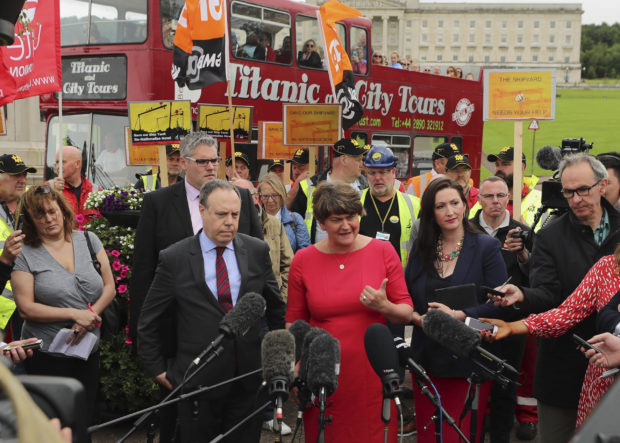PM Boris Johnson visits Belfast as Brexit woes hurt UK economy
LONDON – New British Prime Minister Boris Johnson on Wednesday finished his rocky debut tour of the U.K. in Northern Ireland, where he faces a doubly difficult challenge of restoring the collapsed Belfast government and finding a solution for the Irish border after Brexit.

Ireland’s DUP party leader Arlene Foster, centre, talks to the media with DUP deputy leader Nigel Dodds, centre left, and Emma Little-Pengelly, centre right, following a meeting with Britain’s Prime Minister Boris Johnson at Stormont House in Belfast, Northern Ireland, Wednesday July 31, 2019. Northern Ireland, as part of the UK, has an invisible land border with the Republic of Ireland in Europe, which is a main stumbling block to a Brexit deal, and Johnson depends on Northern Irish political parties for his working majority in parliament. (Liam McBurney/PA via AP)
Since he took office a week ago, Johnson has been touring England, Scotland, Wales and Northern Ireland, but it has not been a triumphal parade.
After facing protests and political opposition in Scotland and Wales, Johnson met Wednesday with the leaders of Northern Ireland’s five main political parties in hopes of kick-starting efforts to restore the suspended Belfast administration.
Northern Ireland’s 1.8 million people have been without a functioning administration for 2 1/2 years, ever since the Catholic-Protestant power-sharing government collapsed over a botched green-energy project.
The rift soon widened to broader cultural and political issues separating Northern Ireland’s British unionists and Irish nationalists.
Johnson said he would “do everything I can to help that get up and running again, because I think that’s profoundly in the interests of people here, of all the citizens here in Northern Ireland.”
Article continues after this advertisementBut a breakthrough did not look imminent. Opponents say Johnson can’t play a constructive role in Northern Ireland because his Conservative government relies on support from the Democratic Unionist Party, the largest of Northern Ireland’s pro-British parties. Without the votes of the DUP’s 10 lawmakers in London, Johnson’s minority government would collapse.
Article continues after this advertisementCritics say that gives the pro-Brexit DUP an oversized influence with the British government, unsettling the delicate balance of power in Northern Ireland.
Mary Lou McDonald, leader of the Irish nationalist party Sinn Fein, accused Johnson of being the DUP’s “gofer.”
“He tells us he will act with absolute impartiality. We have told him that nobody believes that,” she said.
Britain’s 2016 vote to leave the European Union has strained the bonds among the four nations that make up the U.K. A majority of voters in England and Wales backed leaving in the referendum, while those in Scotland and Northern Ireland voted to remain.
Scotland’s nationalist government wants to hold a vote on independence from the U.K. if Scotland is dragged out of the EU against its will. Similarly, nationalists in Northern Ireland argue there should be a referendum on unification with the Irish republic if there is a damaging no-deal Brexit.
Johnson insists the U.K. will leave the EU on the scheduled date of Oct. 31, with or without a divorce deal. Economists say a no-deal Brexit would be economically damaging for the whole U.K. and politically destabilizing for Northern Ireland, the only part of the U.K. to share a land border with the bloc.
The British government said Wednesday that it is setting aside more than 2 billion pounds ($2.4 billion) to prepare for leaving the EU. Treasury chief Sajid Javid said the additional Brexit funds would go to hiring 500 border officers, stockpiling essential medicines and other areas such as public information. /gsg